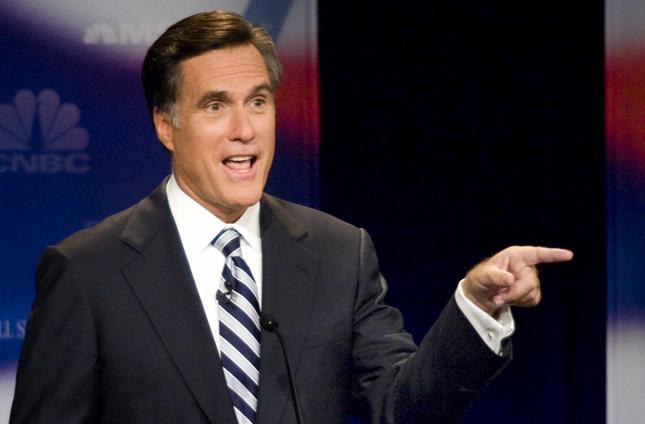The Romney Machine
By • May 3, 2012 0 741

By the time anyone reads this, the New Hampshire Primary for the Republican Presidential Nomination will be over, unless its closer than the Iowa Caucus, in which eight votes separated winner Mitt Romney and runner-up Rick Santorum.
Romney should come out on top, on the way to his seemingly obligatory nomination—unless the quirky New Hampshire political Gods decided to intervene. Romney had a 20-point lead over his rivals and was rolling.
And yet, something seems to be sticking in the collective Republican craw. There is no joy in the GOP version of Mudville. Mighty Romney has failed to strike a chord, even though the words ‘inevitable,’ ‘easy to understand,’ and ‘hard to stomach,’ seem to be attaching themselves to him.
Consider the recent GOP doubleheader, the two debates before the primary within ten hours of each other.
The first, on prime time television on Saturday night with only an NFL playoff game for real competition, offered national viewers of all political stripes a chance to look at what’s left of the slowly winnowing and wavering GOP presidential field. (Michelle Bachman, once the tea party’s darling, conceded that the Iowa voters had spoken and they weren’t talking about her, and dropped out without so much as a tearful farewell).
The two debates—the first a Hound of Baskerville type of occasion in which the anti-Romney dogs didn’t bark—offered some thumbnail pictures of the candidates, and what appears to be of concern to GOP voters, even though almost every prospective voter interviewed by the army of media types covering New Hampshire indicated their main concern was jobs.
Did any of the candidates talk about a secret, previously undisclosed plan to create jobs? Did the candidates trailing the front-runner set on him like a pack of wolves? No to either case.
They talked about gay marriage, they talked about Iran—sort of—they talked about service in the military, they talked about abortion, they talked about contraception. The trailing candidates took swipes at each other but, strangely, not at Romney. That changed the next morning, possibly because Newt Gingrich, Santorum, Ron Paul, Jon Huntsman and Rick Perry suddenly realized that they were in the 11th hour of the New Hampshire primary.
The thing about Romney on both occasion, and almost any occasion, is that he looks presidential. Sometimes he’s doing his Reagan-in-blue-jeans thing, but most often he’s smiling in a suit. He looks like a man who is used to wealth and success, a businessman and a seasoned politician, always smiling, not a hair out of place.
With Herman Cain and Bachman out of the race, the party on the podium retains a certain one-dimensionality. Scanning the audience during the ABC debate, managed by George Stephanopoulos and Diane Sawyer, you’d never get a hint of American diversity.
Romney won by default—nobody laid a glove on him—as the irrepressible Paul, who is about as much a Republican as I am, laid into Gingrich for backing foreign wars when he never served himself. Paul remembered serving even though he was married with children at the time. But the dais was strangely quiet when Gingrich rambled on with great passion about the defense of marriage act, about the “sacrament of marriage” and the Obama administration’s attack on Christianity and religion. This devotion to the sanctity of marriage as defined by a man and a woman was stated with a straight face—for a moment some of us thought he might sniffle again—but coming from the oft-married Gingrich, this was a farcical performance.
Romney never answered a question directly and pursued what’s beginning to sound like a general campaign theme—GOP meritocracy vs. Obama entitlements. This campaign, he said, is a “battle for the soul of America,” which could be a tough fight for the smooth, polished, slick Romney machine. Let’s face it, Romney is running a rather soulless campaign.
The following day, after his pious baloney rant on the sanctity of marriage, Gingrich went after Romney with a demand to “cut this pious baloney.”
Romney had actually attacked Huntsman, the highly successful former Utah governor and fellow Mormon, for working with Obama as Ambassador to China. Huntsman who refused to attack Romney even when invited by Sawyer to take a shot, finally took it the next morning, saying Romney’s attack was the kind of thing that divided America.
Those early-morning back-and-forths may not change things. For the trailing candidates, survivability was the issue in New Hampshire—finish second or in double digits so you can carry on the fight. For Santorum, the hope is that the next stop in South Carolina, where social conservatives and Evangelist Christians are strong, will prove a more fertile ground for him.
Governor Nikki Haley, another tea party fave, has already endorsed Romney, thus entering the VP sweepstakes with the increasingly omnipresent New Jersey Governor Chris Christie. Christie, popular with the media and the tea party, made another campaign appearance for Romney in New Hampshire, this time not trying to joke like Tony Soprano.
Can anybody stop Romney? Not in the GOP. But out there in the coming general election, where the volatility of the economy and the great wide world are daily factors, the outcome is up in the air.

